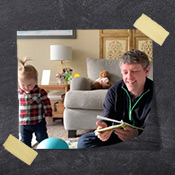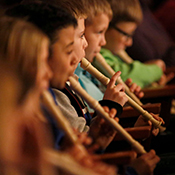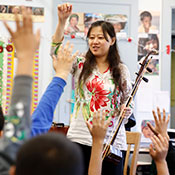
Re-imagining Arts in Community Education Online
David Lewellen
PUBLISHED
Tagged Under: 2020.21 Season, ACE
No school assemblies, no packed concert halls, no musicians sitting shoulder to shoulder – but ACE will go on.
Arts in Community Education, the Milwaukee Symphony’s long-running arts integration program that brings the arts to students within the context of their other studies, has been forced to pause and rethink due to the coronavirus pandemic. But the symphony has created an all-virtual program for the coming school year that may even offer some improvements.
“It’s obviously not going to be the same,” said Rebecca Whitney, the MSO’s director of education. But “we are committed to doing something and doing it as well as we could.”
The solution to the region’s bewildering array of back-to-school plans will be to video-record many of the presentations that ACE artists would have performed for schools. In past years, schools would receive three visits a year from an ensemble for each participating grade, usually K5 through fifth, before a culminating concert at Uihlein Hall in the spring.
Under the 2020.21 arrangement, the MSO is planning professionally produced videos – “not just a thing I did on my phone,” Whitney said – of 30 to 45 minutes that will include much of the same content that a live presentation would, but also add elements such as text or images, “things that technology allows us to do.”
That means that over the course of the next few months, the MSO will produce at least 19 unique videos – three per grade, and four for K5.
“Our regular ACE program was limited by geography,” Whitney said; the MSO wouldn’t send musicians out farther than 45 minutes from downtown. But now, the symphony can market the program to schools farther away, or to home-school families, and “we hope the videos will have a shelf life after the pandemic.” Over time, she said, they may build up a library of offerings so that the videos a grade level receives can vary from year to year with a selection of choices.
“I’m grateful that Rebecca and the folks at the ACE program have decided to re-invent it,” said Jessica Marks, a music teacher at Academy of Accelerated Learning in the Milwaukee Public Schools system. With the video format, “I’ll be able to hit the whole third grade at once with whatever it is.”
Over her 22 years, “ACE has become part of the fabric of the school. It’s a source of comfort and continuity to the kids.” With the aid of video, she has made a recording of herself singing the theme song of each grade, with lyrics as text on the screen. “The students enjoy getting a new ACE song every year,” she said, and watching the videos that the MSO’s musicians make may break up the fatigue of screen learning.
“I know the impact these performances can have,” said Adekola Adedapo, a vocalist with Milwaukee Jazz Experience, who has performed with the ACE program for many years. “I get to sing with an orchestra every year, with all that symphonic sound behind me, and I could just fly.” With bassist John Babbitt and guitarist Roger Brotherhood, “I think we do a lot of good.”
On video, she will miss the in-person connection and the sense of reacting to the crowd, but she and Brotherhood will try to recreate the in-person banter that delights students. “I know our performance reaches these kids, so I’m grateful we have a platform.”
For an ACE presentation, “what gets me up at 8 a.m. on my day off is connecting with kids, and bringing music to them for the first time,” said MSO violinist Paul Hauer, who has performed in an ACE string quartet for three seasons, along with violinist Alex Ayers, violist Alejandro Duque, and cellist Peter Szczepanek. In the new format this year, the quartet is planning to record their previous presentation, as well as scheduling live Zoom sessions with the various schools “to say hi and ask for questions.”
During the involuntary time away from work, “a lot of us struggle with our identity,” Hauer said, “because being a musician in the symphony can take up your life.” To fill some of the void, he has made multitrack videos of himself performing music, taking the opportunity to learn something about audio and video production.
Hauer credited Whitney, and the rest of the MSO’s now-furloughed education department, for their behind-the-scenes work to find a way to offer programming. Even in a pandemic, “we haven’t gone away. We’re not going dark,” he said. “Even if we’re not onstage with 70-plus musicians, we’re still here.”



